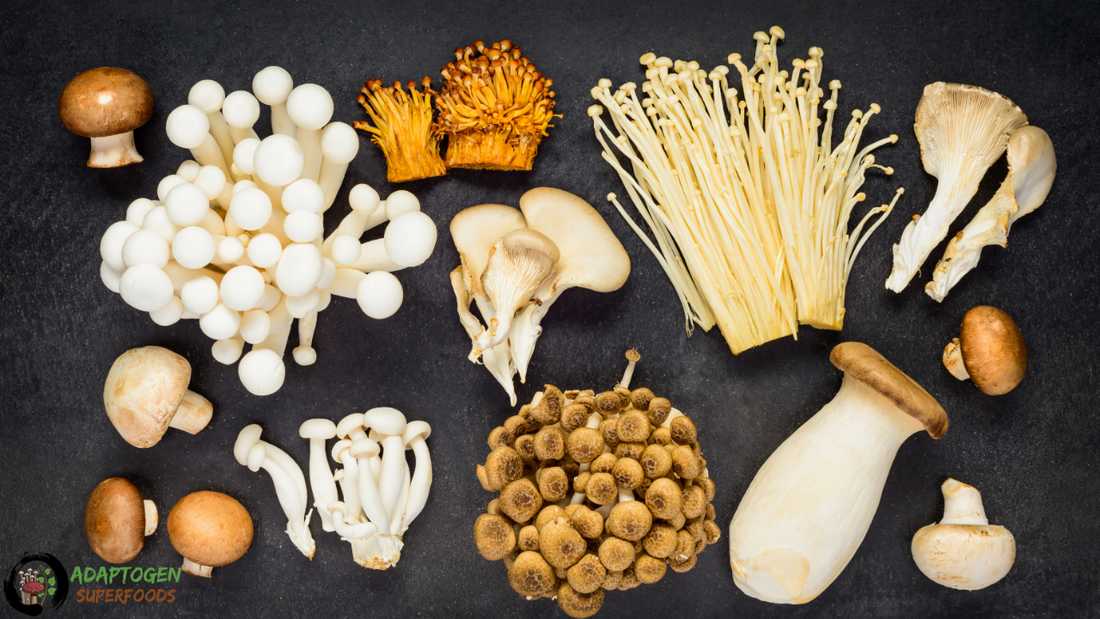
Medicinal Mushrooms and Cancer
Medicinal mushrooms have been used in Asia for a very long time. Not only for general immune boosting, but for very serious conditions like cancer. In fact, there are some mushroom extracts that are actually licensed as adjuvant nutrition in many cancer therapies like Lentinan from the fruiting bodies of the shiitake mushroom, and Schizophyllan, a polysaccharaide extracted from the Split Gill fungus. Turkey tail for instance, has been a widely used and scientifically condoned cancer treatment in Japan for decades. Using a hot-water extraction method they extract a protein-bound polysaccharide known as PSK. Unfortunately pharmaceutical companies are reluctant from funding clinical trials because Turkey tail's traditional use means derivatives are probably difficult to patent. Despite this hurdle, the risk vs reward of using mushrooms for treating cancer and related complications is very promising. In large scale clinical trials, the huge lack of negative side effects when compared to the increased survival times in an wide spectrum of cancers is very exciting. Some of these extracts are starting to show that they promote a wide range of benefits all the way from reduction in chemotherapy and radiotherapy side-effects, to induction to apoptosis, to anti-inflammatory activity.
Suffering from cancer is an awful way to live out the rest of your life, but then add the painful regimens of Radiotherapy and Chemotherapy to the mix and you have a recipe for an on-going bad day to say the least. However, there is evidence of benefit from the use of medicinal mushrooms in tandum with radiotherapy and chemotherapy. In a trial with patients undergoing radiotherapy for lung cancer, the patients ingested 6 grams of mycelial biomass of the Turkey Tail mushroom (Trametes Versicolor) which prevented decreases in white and red blood cells from the radiotherapy. In a similar trial, there was a reduction in radiation-induced leukopaenia by oral cunsumption of Tremella (Tremella Fuciformis) polysaccharide extract. The control group suffered a 35.2% reduction in white blood cells as opposed to the group using the extract who only lost 13.2%. Trials such as these have shown not only a reduction of a lower white blood cell count, but also enhanced treatment efficacy by significantly increasing the number of apoptotic cells as opposed to radiation alone. These are fantastic findings and examples of a truly amazing functional food and dietary supplement.
There is also strong evidence of benefit from medicinal mushroom treatment apace with chemotherapy. In China as well as Japan, medicinal mushrooms and extracts are routinely used along with chemotherapy regimens. There are a plethora of clinical trials showing treatment outcomes that have not only exceeded expectations, but mitigated unwanted side effects of chemotherapeutic agents. For example, hair loss, nausea, improving appetite, and lowered immune capacity have been reduced in some aspect or another. There is also some very compelling evidence that medicinal mushrooms, polysaccarides specifically, can bolster the effectiveness of the chemotherapeutic efforts themselves.
Agaricus Blazei as well as Maitake (Grifola Frondosa) have both been shown beneficial to cancer therapy by encouraging apoptosis.
With all the mounting evidence that clinical trials are starting to show, if you are undergoing treatment for cancer, medicinal mushroom supplements may indeed be your ace in the hole. Contact your health care provider and add that weapon to your cancer-fighting arsenal.
Suffering from cancer is an awful way to live out the rest of your life, but then add the painful regimens of Radiotherapy and Chemotherapy to the mix and you have a recipe for an on-going bad day to say the least. However, there is evidence of benefit from the use of medicinal mushrooms in tandum with radiotherapy and chemotherapy. In a trial with patients undergoing radiotherapy for lung cancer, the patients ingested 6 grams of mycelial biomass of the Turkey Tail mushroom (Trametes Versicolor) which prevented decreases in white and red blood cells from the radiotherapy. In a similar trial, there was a reduction in radiation-induced leukopaenia by oral cunsumption of Tremella (Tremella Fuciformis) polysaccharide extract. The control group suffered a 35.2% reduction in white blood cells as opposed to the group using the extract who only lost 13.2%. Trials such as these have shown not only a reduction of a lower white blood cell count, but also enhanced treatment efficacy by significantly increasing the number of apoptotic cells as opposed to radiation alone. These are fantastic findings and examples of a truly amazing functional food and dietary supplement.
There is also strong evidence of benefit from medicinal mushroom treatment apace with chemotherapy. In China as well as Japan, medicinal mushrooms and extracts are routinely used along with chemotherapy regimens. There are a plethora of clinical trials showing treatment outcomes that have not only exceeded expectations, but mitigated unwanted side effects of chemotherapeutic agents. For example, hair loss, nausea, improving appetite, and lowered immune capacity have been reduced in some aspect or another. There is also some very compelling evidence that medicinal mushrooms, polysaccarides specifically, can bolster the effectiveness of the chemotherapeutic efforts themselves.
Agaricus Blazei as well as Maitake (Grifola Frondosa) have both been shown beneficial to cancer therapy by encouraging apoptosis.
With all the mounting evidence that clinical trials are starting to show, if you are undergoing treatment for cancer, medicinal mushroom supplements may indeed be your ace in the hole. Contact your health care provider and add that weapon to your cancer-fighting arsenal.